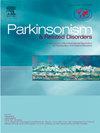Cognitive phenotyping of GBA1-Parkinson's disease: A study on deep brain stimulation outcomes
IF 3.4
3区 医学
Q2 CLINICAL NEUROLOGY
引用次数: 0
Abstract
Background
Heterozygous variants in the glucocerebrosidase (GBA1) gene are the most common genetic risk factor for Parkinson's Disease (PD). GBA1-PD patients exhibit earlier disease onset, severe motor impairment, and heightened cognitive decline. Deep Brain Stimulation (DBS) offers motor improvement for PD patients, but its cognitive effects, particularly in GBA1-PD, are debated.
Methods
This study involved 96 PD patients who underwent subthalamic nucleus DBS at Hospital de la Santa Creu i Sant Pau between 2004 and 2023. Clinical and neuropsychological assessments were conducted pre- and post-surgery, focusing on Mattis Dementia Rating Scale (MDRS) and Frontal Systems Behavior Scale (FrSBe). Patients were categorized into GBA1-PD and non-GBA1-PD groups, with non-GBA1-PD further divided into cognitive fast-progressors and slow-progressors.
Results
GBA1 variants were present in 13.5 % of patients. GBA1-PD patients showed greater cognitive decline over time, particularly in attention, conceptualization, and memory, compared to non-GBA1-PD. Non-GBA1-PD fast-progressors exhibited significant cognitive deterioration in initiation and conceptualization within the first year post-DBS. Motor outcomes improved similarly across all groups, but slow-progressors showed a greater reduction in Levodopa Equivalent Daily Dose (LEDD).
Conclusions
GBA1-PD patients experience more rapid cognitive decline, particularly in posterior-cortical and fronto-striatal functions. Additionally, a subset of non-GBA1-PD patients shows significant early cognitive decline post-DBS, especially in executive functions. Baseline MDRS scores do not predict cognitive outcomes, highlighting the need for further research to refine prognostic tools. Despite cognitive challenges, GBA1-PD patients benefit from DBS in terms of motor outcomes, underscoring the importance of individualized assessments for DBS suitability, regardless of genetic status.
GBA1-帕金森病的认知表型:脑深部刺激疗效研究
背景葡萄糖脑苷脂酶(GBA1)基因的杂合子变异是帕金森病(PD)最常见的遗传风险因素。GBA1-帕金森病患者起病较早、运动功能严重受损、认知能力下降。脑深部刺激(DBS)可改善帕金森病患者的运动功能,但其对认知功能的影响,尤其是对GBA1-帕金森病患者的影响,还存在争议。方法这项研究涉及2004年至2023年期间在圣克鲁-圣保医院(Hospital de la Santa Creu i Sant Pau)接受丘脑下核DBS治疗的96名帕金森病患者。手术前后进行了临床和神经心理学评估,重点是马蒂斯痴呆评定量表(MDRS)和额叶系统行为量表(FrSBe)。患者被分为GBA1-PD组和非GBA1-PD组,其中非GBA1-PD组又分为认知能力进展快的患者和进展慢的患者。与非GBA1-PD患者相比,GBA1-PD患者的认知能力随着时间的推移下降幅度更大,尤其是在注意力、概念化和记忆力方面。非GBA1-PD快速进展患者在DBS治疗后的第一年内,开始和概念化方面的认知能力显著下降。结论GBA1-PD 患者的认知能力下降更快,尤其是在后皮层和前额纹状体功能方面。此外,一部分非GBA1-PD患者在DBS术后早期出现了明显的认知功能下降,尤其是在执行功能方面。基线MDRS评分并不能预测认知结果,这凸显了进一步研究完善预后工具的必要性。尽管存在认知方面的挑战,GBA1-PD 患者仍能从 DBS 的运动结果中获益,这强调了对 DBS 适合性进行个体化评估的重要性,无论其基因状况如何。
本文章由计算机程序翻译,如有差异,请以英文原文为准。
求助全文
约1分钟内获得全文
求助全文
来源期刊

Parkinsonism & related disorders
医学-临床神经学
CiteScore
6.20
自引率
4.90%
发文量
292
审稿时长
39 days
期刊介绍:
Parkinsonism & Related Disorders publishes the results of basic and clinical research contributing to the understanding, diagnosis and treatment of all neurodegenerative syndromes in which Parkinsonism, Essential Tremor or related movement disorders may be a feature. Regular features will include: Review Articles, Point of View articles, Full-length Articles, Short Communications, Case Reports and Letter to the Editor.
 求助内容:
求助内容: 应助结果提醒方式:
应助结果提醒方式:


